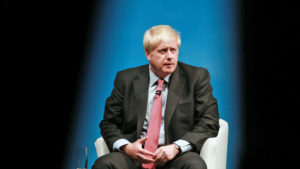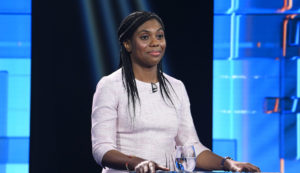Like so many political rivals, Liz Truss and Rishi Sunak are divided by a common ambition. Both want to cast themselves as the heir to Margaret Thatcher. To do that, they are erecting radically different accounts of Thatcher’s time in office, drawing on different parts of her record to teach different political lessons. As they trade allegations of “socialism”, “fairytales” and “something-for-nothing economics’, the two candidates are arguing not only about what they stand for, but about what Margaret Thatcher stood for — and what “Thatcherism” might look like in the future.
Thatcher has a hold on the Conservative imagination that no other leader can match. It is hard to imagine a candidate turning up to a leadership debate dressed as Stanley Baldwin, or modulating their voice to sound like Alec Douglas-Home. Ambitious young Conservatives do not promise “common-sense Majorism”, or curate images of themselves posing as Harold Macmillan. Nor do they launch their campaigns at the birthplace of Sir Edward Heath, like pilgrims seeking blessing at the Church of the Nativity. Only Churchill matches Thatcher’s charismatic authority; yet his standing as a war leader makes him less useful in domestic political debates. There is little mileage in promising to run the economy like Winston Churchill, or to impose Churchillian discipline on public services.
For two candidates who grew up in the Thatcher era, and who lack strong public profiles of their own, the allure of the Iron Lady is obvious. Like Thor’s hammer, Thatcher’s handbag can bestow godlike powers on those deemed worthy to lift it. Yet her centrality to the current campaign also tells us something about the modern Conservative Party, at a time when its political direction has rarely felt less certain.
Thatcher has come to represent three things that are sorely lacking in her party today: intellectual clarity, political longevity, and electability. Like many late-term governments, the Conservative Party often feels like it is reacting to events, rather than shaping them. It is struggling to hold together a diverse electoral coalition, with very different understandings of what it means to be “a Conservative”. It is about to elect its fourth leader in six years, and can smell defeat in the polls. In such a context, there is a particular allure to a Prime Minister who radiated ideological certainty, who set the agenda of British politics for a generation, and who won three general elections in a row. For a party that feels like it is lost in space, the gravitational pull of “Thatcherism” is hard to withstand. The challenge for Liz Truss and Rishi Sunak is to harness it to their purpose.
To do that, they are drawing on very different points in Thatcherite history. Perhaps curiously, as the younger of the two, Sunak seems more attracted to the early Thatcher. His Thatcher believed in “sound money”, “balancing the books” and “tackling inflation”. She treated the national finances like a household budget, where you don’t spend more than you earn and you lie awake at night worrying about a rise in prices. This is the Thatcher who raised taxes during a recession, in the belief that short-term growth was less important than putting the economy back on a secure foundation.
For Liz Truss, it is not the prudent housewife that glitters in the imagination but the “Iron Lady”: the swashbuckling, pugnacious Thatcher who cut taxes, sent the fleet to the Falklands, defied the Soviet Union and, as one of her MPs famously put it, could not “see an institution without hitting it with her handbag”. She seems drawn, in particular, to the later Thatcher: the Gloriana figure who strode the world-stage and boasted of unleashing entrepreneurialism. While Sunak sings what Spitting Image called the “Grantham Anthem” – a hymn to “hard work”, “family values” and attention to detail — Truss’s outfits, speech patterns and Instagram posts evoke more heroic Thatcherite characteristics, such as resolution, determination and a willingness to stand up for Britain in the world.
Neither of these visions is entirely false. They do, however, draw selectively on Thatcher’s time in power. Margaret Thatcher was Prime Minister for 11 and a half years: a period that encompassed an enormous range of challenges and drew out different aspects of her personality. Periods of boom alternated with periods of bust, when revenues gushed in from North Sea oil or inflation neared 12%. A modest majority in the first term ballooned into the landslide majorities of the second and third, while the electoral base of the party shifted significantly across the decade. Subjects such as inflation, unemployment, the Cold War and European integration moved up and down the political agenda, while Thatcher’s own views evolved over time: most famously on Europe and the Single Market, but also on issues such as climate change and the law on homosexuality. As a consequence, her heirs have little choice but to pick selectively, as they seek to annex her legend to their own priorities.
This requires some careful forgetting. Neither Truss nor Sunak would wish to be associated with Thatcher’s views on homosexuality, single parents or the role of women in the home. In the age of Brexit, Thatcher’s enthusiasm for the Single Market has to be gently faded out, and there seems little interest in her short but significant period as an environmentalist. Rhetorically, at least, both Truss and Sunak remain committed to an interventionist, “levelling-up” conservatism that actively intervenes in the economy — a doctrine that Thatcher would have found very alien.
Yet the construction of memory is as much a political exercise as a strictly historical undertaking. The question that exercises the two leadership candidates is not “which version of Thatcher is correct?”, but “which is most potent in the present situation?” Which speaks most directly to contemporary problems? And which, crucially, is most alluring to Conservative party members?
If context is the test, it is the challenges of Thatcher’s early years — the period invoked by Rishi Sunak — that resonate most powerfully. Rising inflation, pressure on public-sector pay, an expansionist Russia and a squeeze on the cost of living would have been painfully familiar to the Thatcher of the first term. By contrast, neither candidate is likely to enjoy the revenues that poured in later in the decade from North Sea oil, privatisation and the “Big Bang”. Yet the destination to which modern Conservatives aspire — a world of tax cuts, higher defence spending, and resistance to the EU — may favour the Gloriana Thatcher conjured up by Truss.
Whether this is helpful to the party remains to be seen. Dressing up as Margaret Thatcher is a risk-free activity when it is Conservative Party members who are lining the cat-walk. It draws a more mixed reaction among the general population. Promising to “run the economy like Thatcher” is unlikely to inspire support among communities that did not share in the economic boom of the Eighties — some of whom voted Conservative for the first time in 2019. For younger voters, in particular, the obsession with a figure who left office a third of a century ago risks looking like political cosplay: a narcotic reversion to the past by a party with no vision for the future. There are dangers in treating a party like a historical re-enactment society, or a political equivalent of the Sealed Knot.
Like so many political icons, however, Margaret Thatcher is no longer a purely historical figure. She has become a creature of myth; and the nature of myths and legends is that each generation tells its own version of the story. Even in her own lifetime, there were many Margaret Thatchers to choose from: the “Iron Lady”, the “Milk-Snatcher”, the prudent housewife, and “the Grocer’s Daughter”. In death, as in life, the struggle for her memory will shape the destinies of Conservative politics. Thirty-five years after she promised to “go on and on”, she would have wanted it no other way.
Disclaimer
Some of the posts we share are controversial and we do not necessarily agree with them in the whole extend. Sometimes we agree with the content or part of it but we do not agree with the narration or language. Nevertheless we find them somehow interesting, valuable and/or informative or we share them, because we strongly believe in freedom of speech, free press and journalism. We strongly encourage you to have a critical approach to all the content, do your own research and analysis to build your own opinion.
We would be glad to have your feedback.
Source: UnHerd Read the original article here: https://unherd.com/




